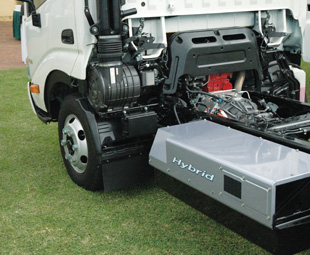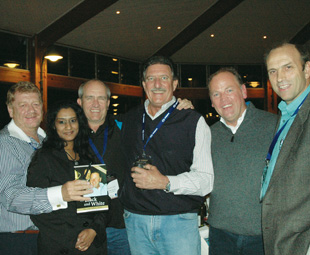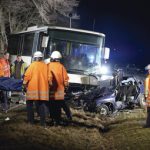Actions speak louder than words

It’s time that something happens – more than just talking. That was the overwhelming impression that HANS WALTER gained from the recent RFA Convention. The consensus, he reports, is that it’s time for action – and not just words …
Over 250 delegates made their way (by bus, plane, car, Gautrain, or a combination) to the 2010 RFA Convention, which was held at the Wild Coast Sun in KwaZulu-Natal from 22 to 24 August.
The golfers started things off on the Sunday and, later, reconnected with old colleagues and compatriots for a cocktail evening. It was there where Jake White explained how the principles he tried to imbue in his Springbok charges could also apply to the transport environment.
Events of this nature are often about reminiscing and networking, but this year felt different somehow. Given the past 24 months, there was a visible collective interest in finding solutions through the presentations that were lined up for the conference.
 Consequently, the turnout for each of the presentations was unprecedented. Were any significant decisions taken? No. Was there a collective commitment to embrace key issues? A resounding “yes”. Were presenters able to allay any fears and uncertainty? I am afraid I am uncertain on that one. At times, presenters from government tried to explain their efforts to get to grips with issues facing the freight transport industry. Many “soothsayers” and experts took the platform over the two days in an endeavour to provide answers to the many crucial issues. Sadly, it must be said that some added more questions than provided answers …
Consequently, the turnout for each of the presentations was unprecedented. Were any significant decisions taken? No. Was there a collective commitment to embrace key issues? A resounding “yes”. Were presenters able to allay any fears and uncertainty? I am afraid I am uncertain on that one. At times, presenters from government tried to explain their efforts to get to grips with issues facing the freight transport industry. Many “soothsayers” and experts took the platform over the two days in an endeavour to provide answers to the many crucial issues. Sadly, it must be said that some added more questions than provided answers …
After the welcoming and opening address by RFA CEO Sharmini Naidoo, the deputy minister of transport Jeremy Cronin delivered his keynote address. Cronin pointed out that there were many issues facing the Department of Transport (DoT). Six percent of the GDP is derived from road freight, which has shown huge growth and, as a consequence, the provincial road networks are in dire straits.
Cronin questioned our ability to fund road repairs given the backlog amounting to R70 billion. He suggested that one of the solutions was to get rail right – not easy to do, he says, as rail is 40 years behind. Furthermore, any efforts in this direction will obviously impact on the road freight industry.
“Recapitalisation is necessary, and it’s a major focus of government to ensure that this change will start to happen within the next two to three years. Furthermore, the freight industry must start to think in terms of freight logistics systems – synergies must happen,” said Cronin.
He also alluded to the challenges we share – such as our carbon footprint, skill shortages, the HIV pandemic, BEE and the owner-driver schemes, as well as the not-very-great success of our SETAs. The deputy minister also stressed that there was a need to regulate the sector and cited overloading, driving hours, operator responsibilities, and a need to get on top of data and statistics as the greatest challenges facing our industry.
FNB chief economist, Cees Bruggemans, gave us access to his crystal ball, which seems to suggest that the world economic picture is favourable for South Africa. In the decade ahead we can expect that the industrial drive in China will place demand on resources and, with a more realistic rand/dollar value level of R8,50, this could work in our favour. Bruggemans’ crystal ball expects the rand to be strong for a longer period, that business confidence levels will improve slowly, but that we need a genuine mindset-change to fully revive our economy.
“We also need to absorb more people into the system than we currently have, even though credit availability will continue to constrain, as will the lower interest rate which is expected to remain as is till late next year,” said Bruggemans.
David Bullard, in his inimitable fashion, pointed out that South Africa is “no longer cute and cuddly to the world” and we need to be competitive.
 “We should recognise a number of facts. Government does not have a business plan; BEE has not worked – it has enriched only a few. Affirmative action has benefited neither employers nor employees – and only facilitated climbs up the corporate ladder,” he noted.
“We should recognise a number of facts. Government does not have a business plan; BEE has not worked – it has enriched only a few. Affirmative action has benefited neither employers nor employees – and only facilitated climbs up the corporate ladder,” he noted.
Bullard also commented on the protection of information debate, suggesting that perhaps electronic media, rather than newsprint, would have the final say.
Bullard then facilitated a panel discussion on future trends in logistics. The conclusion from the discussions was that there is still a place for the intermodal model. It requires, however, more intense discussion and crucial key decisions need to be made. Quite rightly (considering this issue has been on the table for at least 20 years) Terry Bantock, the executive chairman of Buildmax, suggested it was time for somebody to step up to the plate and say, “Let’s do it”.
RFA technical and operations manager Gavin Kelly ably detailed AARTO and the points demerit system. Guess what? It’s not that hard to understand and details can be obtained from the RFA website.
Dr Jan Havenga, director of the Centre for Supply Chain Management at the Department of Logistics at Stellenbosch University, explained how critical freight transport is to South Africa because, unlike other countries around the world, our economic melting pots are situated far from the sea. Therefore, road and rail have a critical role to play. For freight logistics to be successful, rail needs to change. It must become denser and should concentrate on corridors – the N1 and N3 are examples.
These were but a few of the crucial issues discussed and presented. The questions to ask are: Will the industry face these issues head-on as a collective with RFA facilitation? Will the role-players walk in ever-decreasing circles till the issues disappear? Or could they walk in ever-widening circles till they are out of sight?
If attendance figures at the presentations are any indication, then one can expect the industry to face these issues directly. The RFA is most certainly able-bodied and effectively led and one cannot see the organisation lying down. There is a great deal of vested interest in all the issues at stake and it is this that may make the difference.
The event began with warm, balmy weather. It was perhaps apt that a chillier cold front sent us on our way with an element of trepidation for an unknown, but collective, future.
Published by
Focus on Transport
focusmagsa




